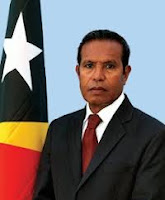 |
| Xanana Gusmao. Image: The News Tribe |
ETLJB
28 May 2013 - According to a report published by Jornal Independente yesterday, the Prime Minister Kay Rala Xanana Gusmao has promised that the mistakes
of the Parliamentary Majority Alliance Government
where State money was improperly used will not be repeated,.
"Maybe you have already
heard people ask why this government is so big, and that is because it
is needed, and I ask each member of government publicly to take these
things into account properly, there has to be good coordination inside
the ministries, otherwise, we are useless governors," he said.
The
head of government made these statements during his decentralisation
and local government discussion for the Dili District, Saturday 25 May
last at the Dili Convention Centre.
Xanana acknowledged that
during the previous AMP government up to the Fifth Government, a lot of
money has been spent by the government improperly, money that has all
just melted away.
Despite having wasted a lot of money, Xanana
made his analysis of the state whereby he said that in ten or so years
of state building after independence, some good things have been done
but there have also been some failures also.
"But we also have to
acknowledge that a lot of money has simply been wasted away, and it is
because of this that from hereon in in the future, we have to identify
these malpractices in administration and management, because although we
have established a control system it is still not effective,"
underlined PM Xanana.
To fix this, according to Xanana, we have
to revise the character of Timorese, revise their conduct so as to
correct the wrongs that have already been committed.
"We also
have to undertake a critical analysis that some money has been well
spent, but some other money we should not question and we should not ask
why it was spent, because it was a need in order to address imbalances
in our society," Xanana said.
Because of this the head of
government asked the members of government who managed public money, who
implement state programs to begin to correct themselves.
As
well, regarding the issue of establishment of municipalities, Xanana
said that there must be reform on the issue of corruption from the
central government to local level.
That he said was important
because the government and the state did not want to continue to hear
complaints when they descended to the grassroots, whether this state was
failing.
"The big risk for us throughout the whole of
Timor-Leste is that we have money, which gives us a big advantage in
planning our development, and that is s big risk because we cannot all
end up drinking sea water," Xanana pointed out.
During this
public discussion Xanana expressed that this was the year to fix the
house from within, so he asked the private sector to prepare themselves
properly.
The private sector he said had to improve its
management capacity, as they should not just be happy with gaining some
money for projects that they have not properly implemented and then
drive around in luxury cars, looking for new projects.
"This
nation needs to develop all its sectors, and needs to reform everyone's
mentality, and because of this the private sector has to be creative in
reinvesting," Xanana stressed.
Source: Jornal Independente 27 May 2013 Edited by Warren L. Wright






